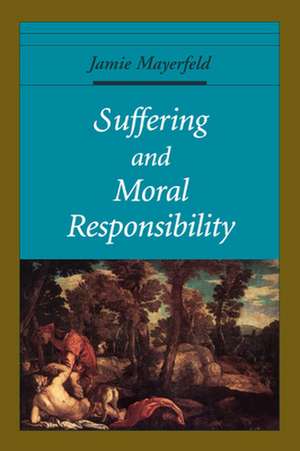Suffering and Moral Responsibility: Oxford Ethics Series
Autor Jamie Mayerfelden Limba Engleză Paperback – 16 mai 2002
Among the claims defended in the book are that suffering needs to be distinguished from both physical pain and the frustration of desire, that interpersonal comparisons of the intensity of happiness and suffering are possible, that several psychological processes hinder our awareness of other people's suffering, and that the prevention of suffering should often be pursued indirectly. Mayerfeld concludes his discussion by arguing that the reduction of suffering is morally more important than the promotion of happiness, and that most of us greatly underestimate the force of the duty to prevent suffering.
As the first systematic book-length inquiry into the moral significance of suffering, Suffering and Moral Responsibility makes an important contribution to moral philosophy and political theory, and will interest specialists in each of these areas.
| Toate formatele și edițiile | Preț | Express |
|---|---|---|
| Paperback (1) | 252.21 lei 31-37 zile | |
| Oxford University Press – 16 mai 2002 | 252.21 lei 31-37 zile | |
| Hardback (1) | 341.46 lei 31-37 zile | |
| Oxford University Press – 7 oct 1999 | 341.46 lei 31-37 zile |
Preț: 252.21 lei
Preț vechi: 265.25 lei
-5% Nou
48.26€ • 50.49$ • 40.09£
Carte tipărită la comandă
Livrare economică 22-28 martie
Specificații
ISBN-10: 0195154959
Pagini: 256
Dimensiuni: 153 x 238 x 17 mm
Greutate: 0.36 kg
Ediția:Revised
Editura: Oxford University Press
Colecția OUP USA
Seria Oxford Ethics Series
Locul publicării:New York, United States
Descriere
In this original study, Jamie Mayerfeld undertakes a careful inquiry into the meaning and moral significance of suffering. Understanding suffering in hedonistic terms as an affliction of feeling, he addresses difficulties associated with its identification and measurement. He then turns to an examination of the duty to relieve suffering: its content, its weight relative to other moral considerations, and the role it should play in our lives.
Among the claims defended in the book are that suffering needs to be distinguished from both physical pain and the frustration of desire, that interpersonal comparisons of the intensity of happiness and suffering are possible, that several psychological processes hinder our awareness of other people's suffering, and that the prevention of suffering should often be pursued indirectly. Mayerfeld concludes his discussion by arguing that the reduction of suffering is morally more important than the promotion of happiness, and that most of us greatly underestimate the force of the duty to prevent suffering.
As the first systematic book-length inquiry into the moral significance of suffering, Suffering and Moral Responsibility makes an important contribution to moral philosophy and political theory, and will interest specialists in each of these areas.

























